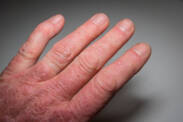Immune system disorders
Immune system disorders include
- Autoimmune disorders
- Allergies
- Immunodeficiencies
- The category you were looking for was not found. Please try another one.
- List is empty.

Allergies
An allergy is a disease of the immune system characterized by a hypersensitive reaction to a specific external stimulus. The prevalence of allergies and the number of allergy sufferers are increasing worldwide. Why do allergies occur and what types of allergens are known?

Anaphylactic shock
An anaphylactic reaction is a severe form of allergic reaction. Allergy is an exaggerated response of the body to an allergen. Anaphylaxis is a serious condition that threatens the health and life of the affected person. It manifests itself in several body systems. Anaphylactic shock is the most severe manifestation of anaphylaxis and immediately threatens human life.

Hay fever
Hay fever is the most common allergic disease. What are its causes and manifestations?

Polymyositis and Dermatomyositis
Polymyositis and dermatomyositis are diseases that are classified as immunogenic idiopathic myositis. In short, autoimmune diseases in which immunity is directed against muscle fibres.

Psoriasis
Psoriasis, also known as psoriasis, is one of the most common skin diseases and affects about 3 percent of the population.

Psoriatic arthritis
Psoriatic arthritis is a long-term progressive inflammatory disease combining psoriasis with joint damage.

Rheumatic Fever
Rheumatic fever is an acute multisystem inflammatory disease. It affects and damages connective tissues. It most often occurs in children of pre-school and school age. It occurs after recovery from a streptococcal infection of the upper respiratory tract and streptococcal angina.

Systemic Lupus Erythematosus
Systemic lupus erythematosus is a chronic autoimmune disease that affects multiple body organs and systems. It has various manifestations. A complete cure is not yet possible.

AIDS - HIV
HIV is abbreviated as the human immunodeficiency virus. The infection attacks cells in a person's lymphatic system. Its worst stage is AIDS - acquired immune deficiency syndrome. How is the disease manifested, transmitted and what treatment options are available?

Scleroderma
Scleroderma is a chronic systemic and autoimmune disease. It is divided into two basic forms, both of which differ in their course and possible complications.

Sjögren's syndrome
Sjogren's syndrome is an autoimmune rheumatic disease characterized by insufficient production of the lacrimal and salivary glands, as well as other glands with external secretion. It mainly affects women.
Many medicines, supplements, vitamins and immunity-boosting products can be found on the pages of our online pharmacy in the immunity section.









